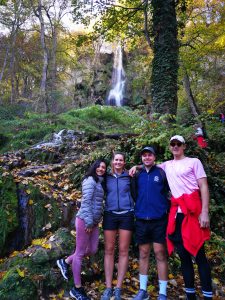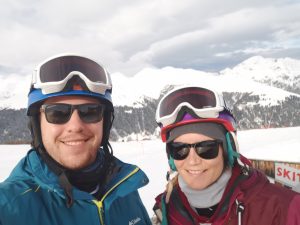DIME (Digital Industrial Management and Engineering) Masters at Hochschule Reutlingen
If you are reading this post, you may have already decided or are in the process of deciding to do a semester exchange. What I can tell you is that you will not be disappointed. I feel that a semester exchange is one of the most valuable experiences you can partake in during your studies (I would almost call it mandatory). My semester abroad in Germany, at the ESB Business School of Reutlingen University, has had a tremendous impact on me as an individual and for my future career plans as an Engineer.

Pre-departure
It is imperative to determine how and what type of semester exchanges would best align with your studies. It is crucial to match the appropriate exchange with your end goals; be it academic, to travel or both. My preparations started as a discussion with my research supervisor at Stellenbosch University to determine if it would be feasible and beneficial to my research. In short, what was my motivation for going abroad? After the initial excitement, the fun started – admin.
The daunting part of a semester exchange can be the admin (planning) aspect, but it does not necessarily have to be that way. Three tips I can give you is: (i) early in the process, talk to others who have done the same or similar exchanges for valuable insight and possible shortcuts; (ii) do a little more effort from the beginning to organize all your documentation as it will save you a lot of time and effort in the later stages; and (iii) try and store all relevant documentation on a cloud (for backup & accessibility).
I would strongly advise you to look into Visa requirements and how long the process will take for your specific exchange. Usually, you can find all this information on the embassy’s webpage, or you can visit any travel agency, like NeelsieTravel, for valuable assistance. In most cases, you require an invitation letter from your host institution for the Visa application. Thus, get into contact with both the host university and Stellenbosch University’s international office to determine what documentation is required from your side and theirs. Trust me, it is not fun to be held up during any part of your process due to waiting for documents.
I made use of the German consulate’s web page, which was very helpful in providing all the relevant information, such as documents required and steps to follow. However, I feel that the web page lacks in providing sufficient knowledge on the financial arrangements necessary for a Visa of more than 90 days. Part of the German Visa application is proving that you can sustain yourself financially while abroad, thus you need to provide proof of bursary(ies), blocked bank account or a combination of the two (remember that opening a blocked bank account requires processing time once initiated). Another thing that is not apparent on the webpage is that you need a letter from your supervisor or SU affiliated person to state that you will be returning to South Africa at the end of the exchange. The Visa appointment is also critical – make sure you have two separate piles of copies with all the required documentation in order. Take copies of extra documentation you deem vital with you for extra reassurance. Rather be over prepared.
My long-stay Visa did not require my flight itinerary prior to application but start looking for flight specials early on. Almost every day, I’ve checked online for flight specials; this equipped me in choosing an excellent affordable flight option. Keep a lookout for baggage allowance, flight time, air service providers reviews, and what time you arrive at the destination (after business hours and weekends can affect transport and other arrangements).
Packing for a German winter is not as easy as packing your warmest clothes, it is not always as cold as you think and even then, the buildings are extremely warm. How to approach it then? One word, layering.
Last tips for travelling… Keep the original and copies of all documentation on you in your hand luggage for in case you are required to support your reason for travelling at passport control and such. This may sound funny but keep at least one extra pair of clothing or at least underwear and a shirt in your hand luggage for unforeseen circumstances such as baggage delays… My bags were lost in a baggage pile-up at Frankfurt airport, and thanks to my mom for instructing me to carry clothes in my hand luggage, I was sorted during the three days I had to wait for my bags.

Experience at the Host University
My semester abroad was my first-time solo travelling as well as being in Europe. Thus, the uncertainty of how things work across the water was terrifying. One thing I learned was to keep calm under all circumstances; all things work itself out eventually. Keeping that in mind, it does not hurt to learn a few key German words before you arrive. Locals tend to be more helpful if you at least try to communicate in their language. In Germany, having access to such a vast network of public transport was amazing. However, getting use to not having your own car to get from point A to point B was sometimes challenging and felt restrictive.
Upon arrival at Reutlingen University, I contacted my study coordinator, and he guided me with my physical registration and my accommodation (keep original documents – Germans want the real thing). I, Marion, and Balthazar (other SU students also part of DIME exchange) were fortunate enough to be placed in the same dormitories on campus, making walking to class far more enjoyable. I would recommend the dormitory we stayed in (Pestalozzistrasse 65) to anyone thinking of this exchange. Most accommodation in Germany were configured as having your private room bordering a shared communal kitchen and a bathroom or two. We shared the dorm with a Mexican and a Chilean and my fellow dorm mates became my closest friends during my stay in Reutlingen. In the rest of the building, we had students coming from all over the world.
The academic side of things was very exciting and stimulating. Reutlingen is a Hochschule, which means it’s a university of applied sciences with a focus on the industry. At Reutlingen they incorporate emerging technological trends and management strategies into their study programs, such as the digitization of the supply chain and logistics industry. I was enrolled in 4 modules and my research project (thesis) at Reutlingen. These modules incorporated aspects of supply chain and logistics management, programming and information and communication technologies, and management accounting. These modules helped with giving me a better understanding and foundation for my research thesis. A useful extra course I took was German (A1.1), which is the most basic level of German, but turned out to be very useful with day to day life in Germany. Being part of the DIME dual degree program, I had a second German supervisor who gave valuable insights from a differing perspective that aligned with my research project. If you would compare my academic experience at Reutlingen to that of Stellenbosch, I want to highlight the following:
- Classes at Reutlingen were much smaller (the largest class was 12 students, master’s level). This resulted in classes being far more interactive and incorporated discussions, presentations and such. Topics were openly discussed and enriched the learning experience by challenging you to consider alternative takes on subjects.
- Do not undersell Stellenbosch University or higher South African education. I am of the opinion that (especially for engineers) Germany does not have the upper hand with regards to the level of academic standards. I, and my fellow maties, found that we were very able to keep up and even found some things easier to grasp than some German students even. This attested to the fact view that Stellenbosch University is world class.
Reutlingen is located in a prime spot as it is close to Stuttgart, München, Switzerland, and the Alps. Thus, there is never a boring moment because there is so much to see in your free time. For example, a 10-min train ride one way, and you’re in the beautiful old town Tubingen with an amazing student life and history. A 10-min ride in another direction and you’re in Metzingen, which has a huge Outlet City for shopping. Once you are in Europe, travelling to other European countries are not that expensive if you are smart about it. Look out for websites such as “kiwi.com” for flight, train, and bus deals. For instance, I flew to Austria and back for only 10 Euros (+- R160). Not seeing myself as a travel junkie prior to exchange, being in Europe and seeing how easy and cheap it is, hooked me. During my exchange I visited Paris (France), Prague (Czech Republic) for new year’s, Davos (Switzerland) with Reutlingen University for skiing, Vienna (Austria), Budapest (Hungary), and a few places in Germany of course. So moral of the story is – one cannot come to Europe and not travel.

Return to Stellenbosch
I must say arriving at Cape Town International Airport and seeing my parents and girlfriend waiting for me after six months was genuinely heart-warming. After becoming accustomed to certain “luxuries” of a first world country, you pick up small things that you wish South Africa had. Reliable electricity, for one. But something I never thought would happen if I did an exchange; is me becoming more attached to South Africa. My initial plans were to search for work in Europe and work there for five or so years before coming back home to SA. Returning has made me appreciate the way we South Africans live even with all the challenges we are facing. It has opened my eyes by making me want to work harder and strive for a successful career here in South Africa rather than just packing my bags and escaping the challenges. South Africa is a gem full of opportunities if you view the country in a more positive light. I am incredibly grateful for the opportunity to have studied in Germany, for the friends I have made, and the life experiences I had. I would go back in a heartbeat and explore even more if possible, but in terms of my future career, I do not see myself working in Europe permanently. However, I will keep my eyes open for opportunities to work abroad from time to time, as I am super grateful for the how this exchange experience had broadened my perspective and inspired me. I would 100% recommend an exchange programme to anyone!


